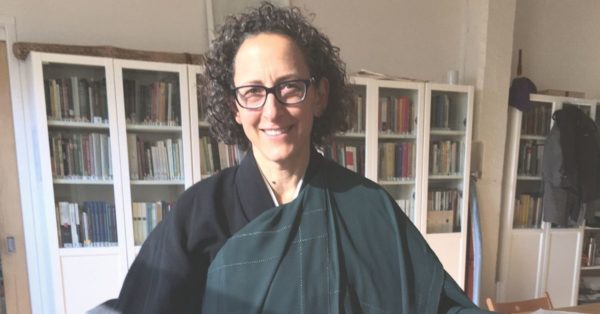
Pamela Weiss wearing green okesa
By Tova Green
Dharma teacher Pamela Weiss was hearing a similar question from many of her students: “How can I find a sense of trust and faith when divisiveness is so rampant in the world?” She decided that the sixth century Chinese poem, the “Hsin Hsin Ming,” translated as “Faith in Mind,” would be a good focus of the three-week Intensive she is leading at City Center May 10 – June 4. The poem is attributed to Zen’s third Chinese ancestor, Sengcan, who died in 606.
Pamela is drawn to the “Hsin Hsin Ming” because it helps illuminate how we can live an undivided life. It begins:
If you wish to see the truth
hold no opinions for or against anything.
To set up what you like against what you dislike
is the disease of the mind.
When the deep meaning of things is not understood,
the mind’s essential peace is disturbed to no avail.
Pamela sees these nondual teachings as an invitation to radical inclusivity – an opportunity to respond to the divisiveness in and around us with wisdom and love.
She has been researching the life and times of Sengcan, who also experienced many struggles during his lifetime.He lived with a chronic illness, and lived at a time when Buddhist monks were persecuted by the government, which forced monks to set aside their robes and be subject to paying taxes. Sengcan chose to flee, and spent many years hiding in the mountains.
When Sengcan met his teacher, Huike (Taiso Eka in Japanese) they had an exchange. Sengcan said to Huike, “I am riddled with sickness. Please cleanse me of my wrong-doing.” Diagnosed as a child with type one diabetes, Pamela also experienced needing to make peace with her body. Huike responded to Sengcan by saying, “Bring me your sickness.” And when Sengcan paused and replied, “I can’t find it,” Huike announced, “Your sickness is cleansed.”
Pamela is a dual lineage teacher in both the Soto Zen and Theravada (Insight meditation) traditions. She has taught primarily in the Insight tradition for the past decade, and described the invitation to come and teach at City Center as “a lovely homecoming.” She lived and practiced at Tassajara and Green Gulch Farm for five years, from 1987 to 1992, was one of the first householder (lay) Shusos (head student), and received Lay Dharma Transmission from Teah Strozer at the Brooklyn Zen Center in 2016.
Pamela has strong positive memories of how deep her learning was when she engaged with the teachings while living at Green Gulch Farm and Tassajara. She brings that experience of embodied learning to her teaching now. “The ability to chew on, digest, and metabolize the teachings during a focused period of practice allows them to penetrate our body, heart, mind, and life. It’s a rare kind of learning, very rich, not like learning in school.”
For the three weeks of the Intensive, Pamela will be onsite at City Center half of each week, living and sitting zazen with the residential community, and will spend the other half teaching and doing zazen online with those who will be engaging in the Intensive from home. She looks forward to stepping back into the forms and traditions at the root of her practice and to experiencing the refuge of community. “All around, I see and feel the hunger in our world for spiritual community and companionship.”
Pamela is the first and (currently) only layperson in the Suzuki Roshi lineage who has received full dharma transmission, including both denbo (authorization to teach) and denkai (authorization to give the precepts), and she wears a green okesa. Pamela prefers the name “householder teacher” to “lay teacher,” and hopes that her visibility as a householder teacher will help support the unfolding of a full path of practice for householders.
To learn more about Pamela’s life and practice she invites you to read her book A Bigger Sky, Awakening a Fierce Feminine Buddhism, which blends memoir with Buddhist teaching and social commentary.
For more information on Pamela’s three-week intensive, see The Mind of Great Faith: Cultivating an Undivided Life (May 10 – June 7).











